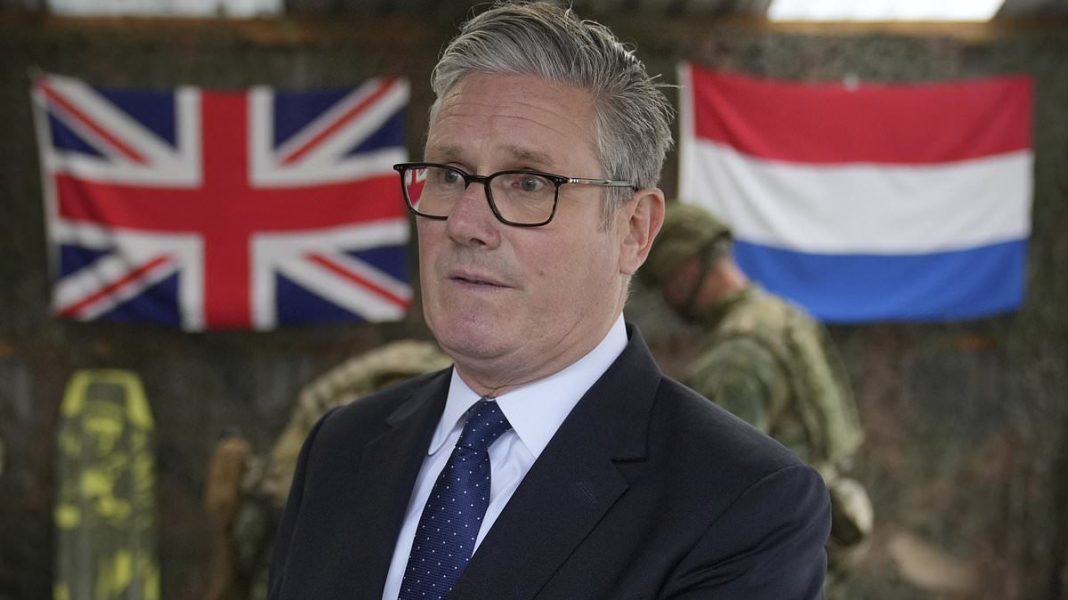The UK should ‘actively prepare’ for a direct attack on British soil in a potential ‘wartime scenario’ for the first time in many years, the Government has warned.
In a national security strategy published today, ministers said the UK now finds itself in ‘an era in which we face confrontation with those who are threatening our security’.
It highlighted Russian cyber attacks and sabotage against the UK, Iranian hostile activity on British soil, and other adversaries ‘laying the foundations for future conflict’.
This includes them ‘positioning themselves to move quickly to cause major disruption to our energy and or supply chains,’ the strategy said.
It added: ‘For the first time in many years, we have to actively prepare for the possibility of the UK homeland coming under direct threat, potentially in a wartime scenario.’
The strategy aims to protect the UK at home and abroad, and also invest more in artificial intelligence (AI) and defence.
Sir Keir Starmer said the UK is ‘facing daily challenges on the home front’ with Britain targeted by ‘very, very frequent and very, very serious’ cyberattacks.
The Prime Minister, speaking to Sky News at a NATO summit in The Hague, added: ‘We have to guard properly against those threats, and we will do so.’
While the national security strategy outlined the threat from Russia, Iran and North Korea, it also highlighted the ‘challenge’ of China as a global actor.
Sir Keir said ‘every element of society’ must be mobilised towards a ‘collective national effort’ to keep the UK safe.
In a foreword to the national security strategy, the PM said: ‘Russian aggression menaces our continent.
‘Strategic competition is intensifying. Extremist ideologies are on the rise.
‘Technology is transforming the nature of both war and domestic security. Hostile state activity takes place on British soil.
‘It is an era of radical uncertainty and we must navigate it with agility, speed and a clear-eyed sense of the national interest.
‘That is what keeping the British people safe demands.’
Cabinet Office minister Pat McFadden told MPs the whole country must now be ‘clear-eyed and hard-edged’ about the threats it faces.
In a statement to the House of Commons, he said the strategy would aim to deliver ‘three crucial things’.
The first of these is to ‘protect security at home’, by bolstering the borders and making the UK ‘more resilient to future threats’.
Ministers are stepping up calls for the whole of society to become more resilient and plan to carry out a cross-government exercise of how to deal with crises – such as a future pandemic – later this year.
The UK must also work to ‘promote strength abroad’ with allies in order to defend their ‘collective security’, Mr McFadden said.
The third step Mr McFadden set out was for the UK to increase its ‘sovereign and asymmetric capabilities’, including by rebuilding its defence industries and building ‘advantages in new frontier technologies’ like AI.
China is a ‘sophisticated and persistent threat’ but freezing the UK’s relations with Beijing is ‘not an option’, Foreign Secretary David Lammy told MPs later.
In his own statement to the Commons this afternoon, Mr Lammy outlined the findings of the Government’s examination of the UK-China relationship.
The ‘China audit’ recommended increasing Britain’s ‘resilience and readiness’ towards the Asian superpower and the Government’s ability to engage with Beijing.
As part of the national security strategy, a summary of the audit set out how ‘China’s espionage, interference in our democracy and the undermining of our economic security have increased in recent years’.
But it also noted how ministers are seeking a ‘trade and investment relationship’ with China to boost the UK economy.
Mr Lammy told MPs that in the past decade China has delivered a third of global economic growth, becoming the world’s second largest economy.
Together with Hong Kong, it is the UK’s third largest trading partner, the Foreign Secretary added.
‘Not engaging with China is therefore no choice at all,’ he said. ‘China’s power is an inescapable fact.’
Mr Lammy said the audit painted a ‘complex picture’ but ‘the UK’s approach to China will be founded on progressive realism, taking the world as it is, not as we wish it to be’.
The Foreign Secretary faced claims that the Government was going ‘cap in hand’ to China to bail out the British economy.
Tory shadow foreign secretary Priti Patel said: ‘It has taken the Government a year to produce this audit, which seemingly fails to set out any kind of serious strategic framework.
‘I think it’s fair to say we know why: because the Government – and in fact the Foreign Secretary has touched on this – has gone cap in hand to China to bail out its terrible handling of the British economy.
‘It is setting up its closer economic ties with China while knowing very well that British businesses here are struggling, not just when it comes to competing against China, but actually struggling to absorb the weight of Labour’s own regulatory costs in this country.’
Mr Lammy was also forced to assure MPs that there are ‘no grubby deals’ with China on any issue, including the proposed ‘super-embassy’ in London.
Former Conservative leader Sir Iain Duncan Smith told the Foreign Secretary: ‘I’ll give him a quick audit now of exactly what should have been.
‘China threatens Taiwan, has invaded the South China Sea, it’s having massive disputes with the Philippines, genocide, slave labour, organ harvesting, transnational repression, taxes Hong Kong dissidents here, Hong Kong dissidents under threat constantly, cyber-attacks on the UK, supports Myanmar in their oppressive military regime, supports Russian’s invasion of Ukraine, it also supports North Korea and Iran and has trashed the Sino-British treaty on Hong Kong, it has arrested Jimmy Lai, it has sanctions on UK MPs and it thieves all the IPs on private companies.
‘What a record to balance, what? Against some potential trade?’
He added: ‘In the course of this embassy decision, it was said quite clearly in the media that China would not apply again after the refusal of Tower Hamlets (Council), unless they received assurances from the UK Government.
‘Can he now tell me that they have not received any assurances, or have they received private assurances that they will get what they want and get this embassy?’
Mr Lammy responded: ‘Let me just express respect for (Sir Iain’s) experience in relation to the China threat and also that he is subject to sanctions that I have consistently raised with China, noting that recently it lifted sanctions against members of the European Parliament and I pressed them recently to do the same.
‘Let me assure him that there are no grubby deals on any issues and certainly not in relation to the embassy – and I reject any suggestion of anything other.’






